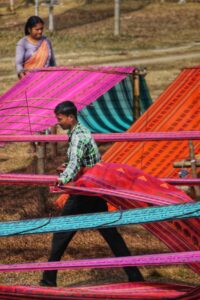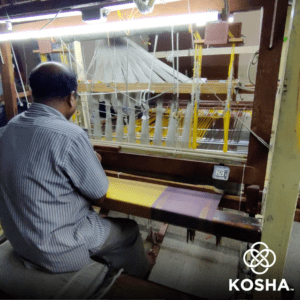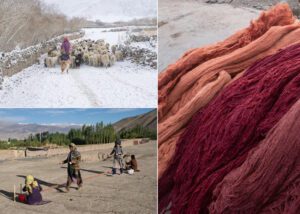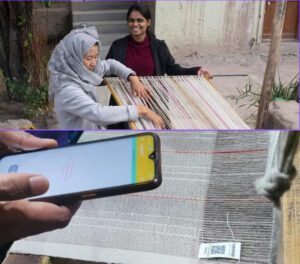Key takeaways from the Masterclass ‘Talking Traceability with Kosha’, November 22, 2023.
An Interactive Masterclass with Vijaya Krishnappa, Co-founder, Kosha.
Kosha is an innovative platform specializing in traceability, authenticity, and supply chain solutions uniquely crafted for the artisanal business sector.
Plus Enterprise Case Study: Abhilasha Bahuguna, Looms of Ladakh and North-Eastern Handicraft & Handloom Development Organisation (NEHHDC) on reasons for adopting digital resources for business and tracking environmental and social impact.
Curated by Surucchi Khubchandani, Crafts & Sustainability Consultant
Why Traceability and Authenticity in the Handmade Sector
Traceability in supply chains critical due to ethical, environmental, and authenticity concerns
Quality Assurance: Traceability ensures that the materials used in handmade products meet quality standards. Knowing the origin and history of each component allows for better control over the production process, helping maintain consistent quality.
Ethical Sourcing: Many clients and consumers today are concerned about the ethical and sustainability credentials of the products. Traceability allows for transparency in the sourcing of materials, ensuring that they are ethically and sustainably produced.
Preventing Counterfeiting: Handmade products are susceptible to counterfeiting, especially if they gain popularity. Traceability measures, such as unique identifiers or tracking systems, can help in distinguishing genuine products from counterfeit ones, protecting both consumers and the brand.
Storytelling and Marketing: Social, environmental and material records are not only necessary to be able to prove transparency and track improvements but is also vital in the story-telling of brands, products and fibres. Consumers are more likely to connect emotionally with products that have an authentic and traceable narrative.
Brand Reputation: Handmade products often carry a certain level of prestige and uniqueness. If a business can demonstrate that its products are genuinely handmade and that the materials are sourced responsibly, it enhances the brand’s reputation for authenticity and craftsmanship.


Technology as a Solution
Decentralised Systems: Textile industry is highly decentralised from farm to fabric stage. Solutions such as the use of additive tracers at the raw material stage, the use of inherent tracers like chemical fingerprints unique to different regions where cotton is grown, and the use of identity tags like RFID, NFC, or QR codes can provide product information and enhance traceability.
Handloom Solutions: Kosha provides a portable device ‘Hasta’ to weavers which when fixed on a loom, captures information and analyses movement of loom to classify the loom as handloom. This solution leverages various technologies including IoT, AI/ML, Block Chain and cloud computing.
Handicraft Authenticity Technology: KOSHA has developed a wearable watch, Hasta. When worn on the wrist by artisans who are involved in crafts other than handlooms (block printing, embroidery, etc), the device captures information and analyses gestures of the artisans to classify the craft as handmade or not.
Cost: The one-time cost of Hasta for a single loom is around ₹6,500 with an annual cost of ₹3,500.


1st Case Study:
Looms of Ladakh on Enterprise Resource Planning (ERP)
Abhilasha Bahuguna discussed how her brand, Looms of Ladakh, has utilized Kosha’s ERP technology, Kosha Trace, to streamline its production and supply chain besides pilots with RFID tagging.
Enterprise Resource Planning (ERP) software is helping Looms of Ladakh manage its decentralised production led by herder communities in Leh, Trishul, Kargil. ERP enables live product tracking, timely payments, better waste management as well as scale production.
Abhilasha brought attention to the hurdles encountered in implementing the software at the decentralized village level, notably the gradual acceptance by the older generation, resulting in a 70% implementation rate.
Traceability mechanisms such can provide data on skewed livestock ratio vis-à-vis its environmental impact, promote cruelty-free practices. She also suggested exploring niche traceable fiber with an ecosystem approach for global positioning which will in turn also secure future of youth of the region.
She discussed the potential of RFID (radio frequency identification) tagging in the fashion industry and the importance of regenerative practices due to environmental stress on pasture land.




2nd Case Study:
North-Eastern Handicraft & Handloom Development Organisation (NEHHDC)
North-eastern states of India are a hub of handloom and handicraft products production. North-Eastern Handicraft & Handloom Development Organisation (NEHHDC), the nodal body from the region was facing difficulty in proving authenticity of their handcrafted products to the export houses and international buyers.
Kshitij Hazarika, Head of Production and Quality Control at HEHHDC, highlighted that the adoption of technology by 10,000 artisans in the region, facilitated by Kosha, has alleviated authentication concerns. This advancement has enabled them to successfully supply their products to countries such as Germany, France, and the USA.
Tech-adaption by clusters has also reduced dependency on middlemen. NEHHDC will soon be starting a pilot to create a traceable cocoon to product chain for its Muga and Eri silk clusters.
Reach the Speakers:
Vijaya Krishnappa, Kosha – vijaya.k@kosha.ai
Abhilasha Bahuguna, Looms of Ladakh – abhilashabahuguna9@gmail.com; loomsofladakh@gmail.com


Creative Talks – a Creative Dignity initiative is a series of exciting conversations about the handmade sector, connecting key thinkers with each other, and you. You’ll hear from artisans, designers, enterprises, philanthropists, and individuals all of whom bring their unique perspectives on what it takes to harness the massive potential of craft.
The “CraftxClimate” series aims to position the crafts sector at the forefront of UN SDG 12 ‘Responsible Production and Consumption’ through issue identification, knowledge sharing, capacity building, and advocating sustainable solutions.